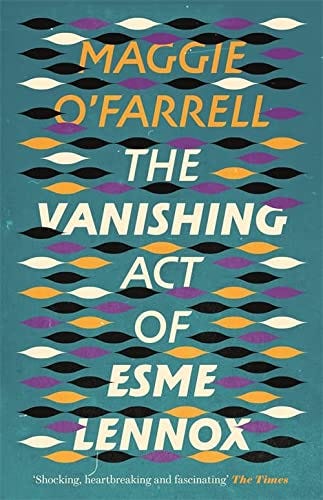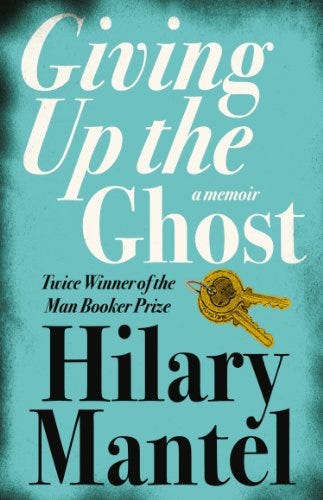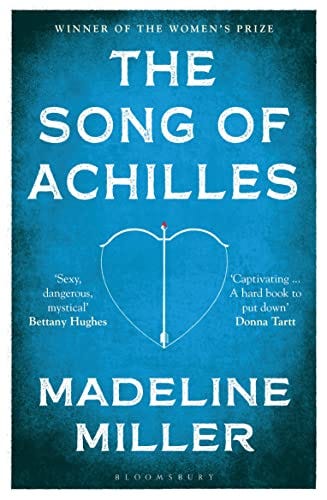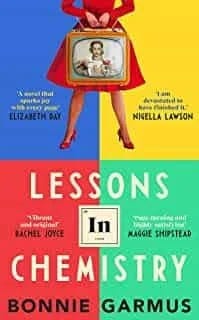Feliz año nuevo, my Global Jigsaw family,
I hope 2023 is gentle on all of us and that it holds within it the opportunity for much reading. I thought I’d begin this New Year with a post about some of the best books I read last year (in no particular order).
1) The Vanishing Act of Esme Lennox by Maggie O’Farell
The first O’Farell novel that I read, a couple of years ago now, was the award-winning Hamnet (2020). That was a fictionalized account of the short-life of Shakespeare’s son, who died during a plague outbreak at the age of 11. The bard is believed to have named the protagonist of what many consider his finest work, Hamlet, after this little-known boy. However, Shakespeare himself plays but a cameo in this book.
The main ground is held by Agnes, wife to the bard and the mother of Hamnet, a whippet -smart, medicine woman, with a heart too big for the grotesqueries endemic to early modern Europe.
This is a very female-centered book about love and the grief that can be its twin; and about finding your way through loss. A part of you is amputated in the process, but the will being strong, you endure, and perhaps even find replenishment.
In this sense, Hamnet is related to most of the books I enjoyed this year, starting with the extraordinary: The Vanishing Act of Esme Lennox (2008), an earlier work by the same author.
“Esme,” is about the six decade-long incarceration in a lunatic asylum of a young girl-turned old woman, at the hands of her parents, who are at a loss at how to deal with their neuro-divergent daughter. Once locked away, Esme is systematically erased from existence by her own family, until a great niece receives a phone call from the asylum on the eve of the institution’s closure.
The novel’s style, sparse though it may be, conveys mirrored layers of emotion: horror, injustice, disbelief, with a soupçon of redemption.
Reading the book in 2022, can beggar belief, but it’s based on historical fact. During the Victorian era, women who behaved aggressively, independently, melancholically, or overtly sexually were vulnerable to accusations of madness. It merely needed the consent of their fathers or husbands for them to be locked away without recourse. Towards the end of the 20th century, when the old prison-like mental asylums were being closed down in the United Kingdom, some elderly (the majority of whom were female) patient-inmates emerged blinking into the sunlight perfectly sane.
You can read more about this here.
I read the book, while sunning in Ibiza this summer, a few weeks before receiving my cancer diagnosis, which segues into my next recommendation:
2) Giving up the Ghost by Hilary Mantel
Mantel’s Wolf Hall trilogy is extraordinary and needs no further praise from me. Her memoir, “Giving Up the Ghost,” (2003) is less well known. I read it in September last year, the same month that Mantel died, leaving us readers only her ghost and her books for company.
The memoir describes a difficult childhood and a difficult adulthood, both riddled by pain and illness, but leavened by imagination and the ability to look at oneself from afar. These are tricks that have also got me through the last few months, as a I’ve lain on biopsy tables and sat through chemo infusions.
Through adolescence, Mantel suffered from various misdiagnoses including hysteria and mental disease at the hands of a smorgasbords of smug and incompetent male doctors, until she was able to self-diagnosis (while living in Botswana) her condition as endometriosis. This involves the tissue that lines the inside of the uterus — the endometrium — growing outside of the uterus.
If left untreated, the womb lining migrates to locations it has no business being in, such as on the ovaries or within the peritoneal cavity. It “metastasizes”. By the time Mantel gets treatment in 1980, at the age of 27, she is subjected to the excision of her womb, ovaries and part of her bowels and bladder. She wakes up from the surgery to premature menopause and infertility. Later, years of ingesting hormone replacement tablets changes her body’s contours – both the visible and invisible parts.
Writing was her way of surviving the ghosts of her unborn children and the pain that was her constant companion. “I wrote and wrote,” she said. Even as she got sicker, she kept writing. “Bald, odd-shaped, deaf but not defeated, I sat down and wrote another book.”
This is a memoir that is both angry and witty, scalding and clear-eyed. “The story of my own childhood,” Mantel wrote, “is a complicated sentence that I am always trying to finish, to finish and put behind me. It resists finishing, and partly this is because words are not enough; my early world was synaesthesic, and I am haunted by the ghosts of my own sense impressions, which re-emerge when I try to write, and shiver between the lines.”
Mantel said she wrote because that was the one activity she could do while being prone. As do I today, writing this first post of the New Year. The very day after chemo #3.
“I was seethingly ambitious..I needed to be somebody,” she said, speaking to me across the years and pages. “The only way I could think of was by writing. Because all you need is paper and pencil and you can do it horizontal.”
I needed no more inspiration than these lines to keep at the work, cancer be damned.
3) I also really enjoyed Madeline Miller’s, The Song of Achilles (2011), which I finished over two days, early in 2022. I had read Circe (2018), by the same author, the year before. Both are retellings of Greek myths, Circe being closer to the female centered books of my previous recommendations.
To grow up in India, as I had done, was to have been saturated in Indian myths from Hindu epics like the Ramayana and Mahabharata. I’d fallen in love with their grey morals and bad-good Gods, who while very human in their foibles and failings, were also formidable in their power and wrath.
My son, Nico, began his odyssey (pun ended) into an obsession with Greek mythology about two years ago. As I tried to keep step with him, I commenced on a belated education into the worlds of Gaia, Zeus, Prometheus et al. It was like coming alive to a bridge between the East and West regardless of Kipling’s declaration of how “never the twain shall meet.” Poppycock! The Greek Gods and their Hindu counterparts were cousins at the very least.
The Song of Achilles is a reimagining of parts of Homer’s, The Illiad and the escapades of its protagonist, the Godlike warrior with a weak heel. But it is told from the intimate point of view of Achilles’ mortal lover and best friend, Patroclus. It is the latter’s death at the hands of Trojan Prince, Hector, that rouses the demigod to the crazed, ugly rampage on the battlefield that leads to his own demise: the result of an arrow shot through his one weak spot, the back of his heel, by Paris, the brother of Hector.
Despite the larger context of the blood and gore of the Trojan War, the Song of Achilles holds within it the story of a gentle, nourishing love between two men that is modern without being self-consciously so.
4) Lessons in Chemistry by Bonnie Garmus
This one was sent to me by a dear friend, Maya Matthews, who still does things like sending book packages via the post. I read it in November, while recovering from my mastectomy. The novel’s unquenchable heroine, Elizabeth Zott, brilliant scientist, powerful rower, reluctant cooking-show host, grieving lover, devoted mother and English language teacher to a dog called Six Thirty, dispelled any moments of self-pity that might have crept on me during this time.
Here's what Zott has to say about fear: “Whenever you feel afraid, just remember. Courage is the root of change - and change is what we're chemically designed to do.”
Lessons in Chemistry is a revenge tale for all the indignities heaped upon women with ambition in the 1950s and 1960s: a feminist book fizzing with sodium bicarbonate.
5) Mrs March by Virginia Feito
So, I’m cheating a bit with this book, because I read it towards the end of 2021, not last year. But its one that you should know about if you are in the market for an intelligent psychological thriller, that places you inside the claustrophobic, disordered mind of a woman on the brink of psychic collapse.
It’s a gothic comedy of manners with more than a whiff of Hitchcock. The protagonist, Mrs. March is an unreliable narrator who is clearly leading the reader to a horror. One that remains unknown in its details, but lurks in the margins throughout.
The novel is set in mid- twentieth century, Upper East Side New York. And the atmosphere it evokes is pitch-perfect made remarkable by the fact that the author is a Spanish woman, who worked as a copywriter at an advertising agency in Madrid. The book, Ms Feito’s debut, was written in English and published internationally prior to its Spanish edition.
****
I hope you have enjoyed reading these recommendations. Please do add your own in the comments section. May we all find the peace of mind to read slowly and well in 2023.
Could I also remind you to start off this New Year by upgrading to being a paying subscriber of the Global Jigsaw? I’m sure that’s a resolution many of you have made :-)
***
I am aware that all my book recommendations in this post are novels, save the one memoir, by women. So next week’s newsletter will focus on a work of non-fiction by Giles Tremlett (very much a man) about the International Brigades that fought alongside local troops during the civil war (1936-39). It will also feature a guest post about one of the six Indians who are known to have joined these Brigades.
Hasta la proxima semana.
With love,
Pallavi








Thanks for the reading suggestions, always very much appreciated (and for recommending my Substack!).
I'm more a non-fiction reader, but your post is about novels and women, so I'm going to mention Zoe Fairbairns's "Daddy's Girls" (1992). Fairbairns is what literary critics like to call a "feminist writer" (she used to be the poetry editor of British magazine Spare Rib) which sounds a little limiting though it is true that all her novels deal with women's position in society.
"Daddy's Girls" is about a family of five in 1960s England: a conservative, chauvinist, cheating father, his long-suffering wife, and their three daughters who have a radically different relationship with their father.
It's very well written, engaging, thought-provoking, with great dialogues.
Thanks for these recommendations, Pallavi and the personal stories connected with each.
Much love...